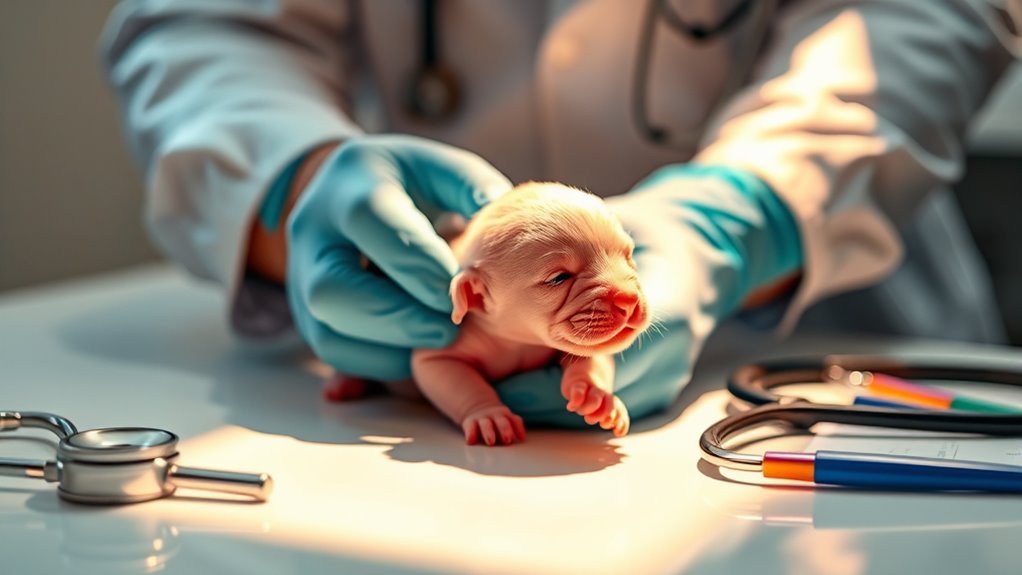During your pet’s first vet visit, expect a thorough physical exam, including checks of their eyes, ears, teeth, and coat, along with monitoring heart and lung function. Your vet will discuss vaccination schedules, preventive care, and answer questions about nutrition, grooming, or behavior. This visit helps establish a trusting relationship and sets a health foundation. Keep in mind, there are important topics to explore further that can make future visits smoother.
Key Takeaways
- Expect a physical exam, including eyes, ears, teeth, coat, heart, and lung checks, to assess overall health and identify issues.
- The vet will review and recommend a vaccination schedule for diseases like distemper, parvovirus, and rabies.
- Prepare questions about nutrition, grooming, behavior, microchipping, spaying/neutering, and any health concerns.
- The visit helps establish a trusting relationship with your veterinarian for future care and support.
- Discuss preventive care, potential breed-specific needs, and follow-up appointments to ensure ongoing health.

Are you wondering when to schedule your pet’s first vet visit? If so, you’re asking the right questions about your new furry friend’s health and well-being. The first visit is a vital step in establishing a foundation for good pet health, so it’s important to be prepared. Typically, your veterinarian will recommend bringing your puppy or kitten in around 6 to 8 weeks of age, but this can vary depending on your pet’s circumstances. During this initial appointment, the vet will focus on evaluating your pet’s overall health, discussing a vaccination schedule, and addressing any concerns you might have.
When you arrive, expect the vet to perform a thorough physical exam. They’ll check your pet’s eyes, ears, teeth, and coat, as well as listen to their heartbeat and lungs. This helps identify any immediate health issues and gives the veterinarian a baseline for future visits. In terms of pet health, the vet will also look for signs of parasites like fleas, ticks, or worms, which are common in young animals. They might recommend a deworming treatment if necessary and discuss preventive care to keep your pet healthy. This is also a good time to ask about nutrition, grooming, and exercise routines tailored to your pet’s age and breed.
One of the most important parts of the first vet visit is establishing a vaccination schedule. Vaccines are essential for protecting your pet from serious diseases, and your vet will advise you on the appropriate shots for your pet’s age and risk factors. They’ll likely recommend core vaccines such as distemper, parvovirus, and rabies, along with any optional vaccines based on your pet’s environment. The vet will also explain the importance of booster shots and when to return for follow-up vaccinations. Having a clear vaccination schedule helps guarantee your pet stays protected and reduces the risk of illness down the line.
During the appointment, don’t hesitate to ask questions. Whether you’re concerned about feeding routines, behavior, or potential health issues, your vet is there to guide you. It’s also helpful to discuss microchipping, spaying or neutering, and any special care your pet might need. Additionally, understanding the smart toilet features can be beneficial if you have a smart home setup, as it can provide insights into your pet’s bathroom habits and overall health. Remember, establishing a good relationship with your veterinarian early on makes future visits easier and more productive. By being prepared and asking the right questions, you set the stage for a healthy life for your pet. The first vet visit isn’t just about vaccinations; it’s about creating a partnership that supports your pet’s well-being for years to come.
Top picks for "first visit expect"
Open Amazon search results for this keyword.
As an affiliate, we earn on qualifying purchases.
Frequently Asked Questions
How Soon Should I Schedule My Puppy’s First Vet Visit?
You should schedule your puppy’s first vet visit by 6 to 8 weeks of age. This allows your vet to establish a vaccination schedule and check for any health milestones. Early visits are vital for monitoring growth, addressing concerns, and setting a foundation for lifelong health. Don’t wait too long—prompt appointments help guarantee your puppy develops properly and stays protected against common illnesses.
What Should I Bring to the First Appointment?
You should bring essential pet health supplies and an appointment checklist to make certain nothing’s overlooked. Pack your puppy’s vaccination records, a list of questions, and any medications they’re on. Bring a collar, leash, and a familiar blanket to comfort your pup. Don’t forget to include a water bowl and some treats. This preparation helps the vet provide thorough care and makes the visit smooth and stress-free for your new furry friend.
How Often Should I Schedule Follow-Up Visits?
You should schedule follow-up visits based on your pet’s vaccination schedule and any health concerns. Typically, young pets need check-ups every 3-4 weeks until fully vaccinated, then annually. Use these visits for a behavior assessment and to address potential issues early. Regular appointments guarantee your pet stays healthy, and your vet can adjust the schedule as needed, keeping your furry friend happy and protected.
Are There Specific Health Concerns for Certain Breeds?
Yes, certain breeds have breed-specific health and breed-related concerns you should watch for. For example, large breeds like Great Danes are prone to joint issues, while small breeds like Chihuahuas may face dental problems. Research your dog’s breed to understand potential health risks. Regular vet visits help catch breed-specific concerns early, ensuring proper care and a healthier, happier life for your pet.
How Can I Prepare My Pet for the Vet Visit?
Getting ready for your pet’s vet visit can feel like preparing for a rocket launch! Start with a gentle pet grooming session to keep them calm and comfortable. Bring their favorite toy, recent diet planning notes, and any medications. Make sure they’re well-hydrated and avoid feeding right before the appointment. This way, your furry friend stays relaxed, and the vet can provide the best care possible.
Conclusion
Your first vet visit is just the beginning of a lifelong journey caring for your pet. As you leave the clinic, imagine the future moments—playful paws, gentle purrs, wagging tails—all rooted in the health decisions you made today. But remember, this is only the start. The questions you asked and the care you provided will shape countless memories ahead. Are you ready to take the next step in your pet’s adventure? The best is yet to come.










